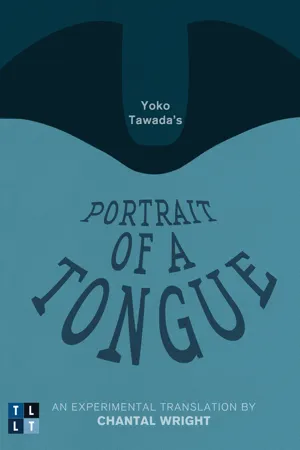
- 160 pages
- English
- ePUB (mobile friendly)
- Available on iOS & Android
Yoko Tawada's Portrait of a Tongue
About this book
Yoko Tawada's Portraitof a Tongue: An Experimental Translation by Chantal Wright is a hybridtext, innovatively combining literary criticism, experimental translation, andscholarly commentary. This work centres on a German-language prose text by YokoTawada entitled ' Portrait of a Tongue '[' Porträt einer Zunge ', 2002]. YokoTawada is a native speaker of Japanese who learned German as an adult.
Portrait of a Tongue is a portrait of a German woman—referred to only as P—who has lived in theUnited States for many years and whose German has become inflected by English.The text is the first-person narrator's declaration of love for P and for herlanguage, a 'thinking-out-loud' about language(s), and a self-reflexivecommentary.
Chantal Wright offers a critical response and a new approachto the translation process by interweaving Tawada's text and the translator'sdialogue, creating a side-by-side reading experience that encourages the readerto move seamlessly between the two parts. Chantal Wright's technique modelswhat happens when translators read and responds to calls within TranslationStudies for translators to claim visibility, to practice "thick translation", and to develop their own creative voices. This experimental translationaddresses a readership within the academic disciplines of Translation Studies, Germanic Studies, and related fields.
- This book is published in English.
Tools to learn more effectively

Saving Books

Keyword Search

Annotating Text

Listen to it instead
Information
“Portrait of a Tongue”










Table of contents
- Cover
- Title page
- Copyrights
- Acknowledgements
- Introduction
- “Portrait of a Tongue” by Yoko Tawada
- Translator's Commentary
- Bibliography
Frequently asked questions
- Essential is ideal for learners and professionals who enjoy exploring a wide range of subjects. Access the Essential Library with 800,000+ trusted titles and best-sellers across business, personal growth, and the humanities. Includes unlimited reading time and Standard Read Aloud voice.
- Complete: Perfect for advanced learners and researchers needing full, unrestricted access. Unlock 1.4M+ books across hundreds of subjects, including academic and specialized titles. The Complete Plan also includes advanced features like Premium Read Aloud and Research Assistant.
Please note we cannot support devices running on iOS 13 and Android 7 or earlier. Learn more about using the app